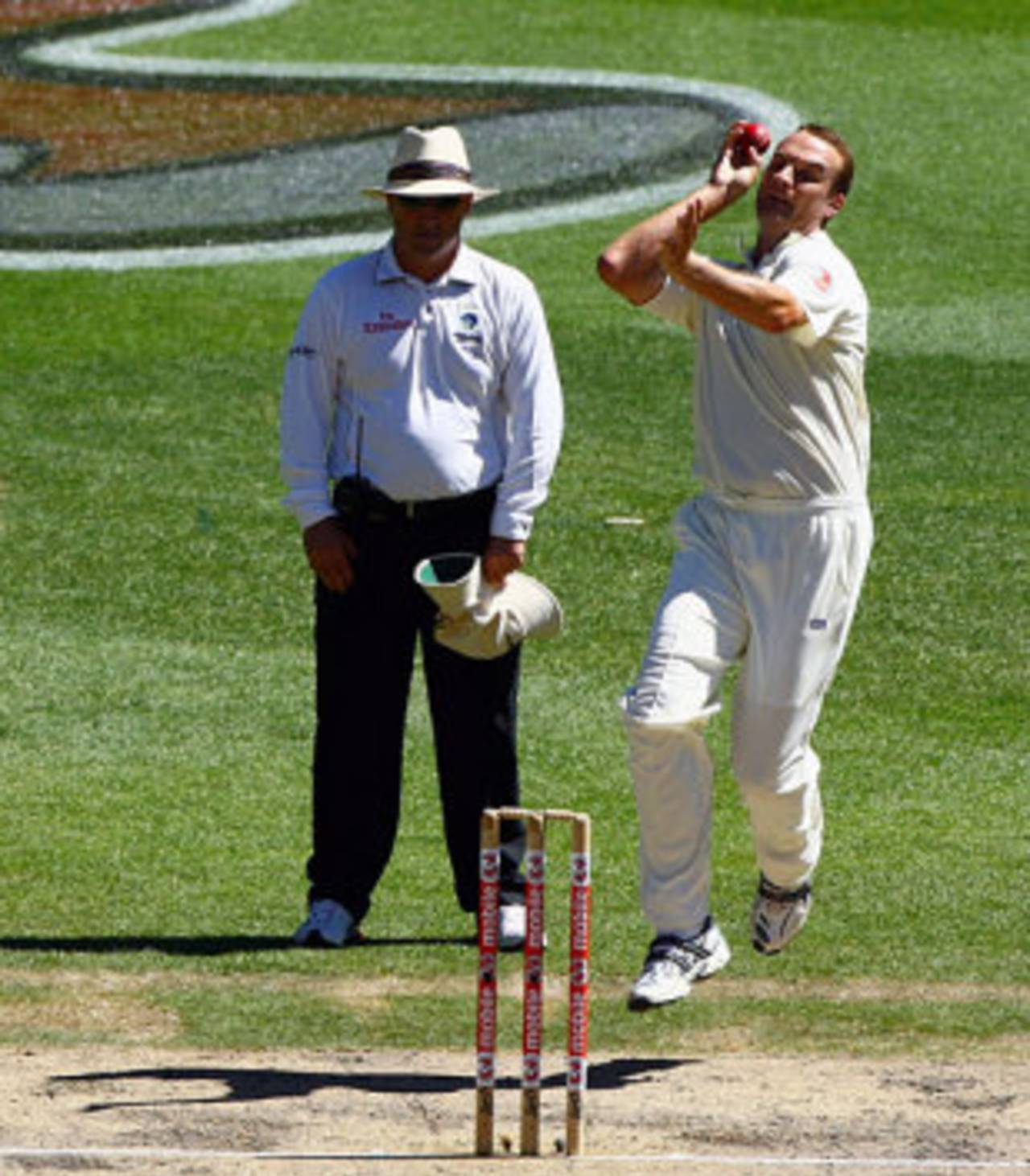Consistent Clark has much still to offer
On the field, Stuart Clark was straightforward yet methodical, and now he will take those attributes into his cricket administration career.
Brydon Coverdale
18-May-2011

Stuart Clark's action, like most things about him, was efficient • Getty Images
When Australia whitewashed England in the 2006-07 Ashes series, it wasn't Shane Warne or Glenn McGrath, or even Brett Lee who took the most wickets. It was Stuart Clark, a 31-year-old former real-estate agent who started the summer with all of four Tests to his name.
While McGrath talked of smashing England 5-0 before the series began, and Warne was his usual cocky self, the mild-mannered Clark quietly went about his business and nipped out 26 Englishmen. He didn't take a five-wicket haul, but only once did he collect less than five for the match.
That sort of consistency was always key with Clark. He hit the crease with a flat, efficient delivery stride, probed with McGrath-like accuracy, used his height for bounce and nibbled the ball just enough to worry the batsmen.
One of his team-mates describes him as "from the old school - he keeps it simple". Simple maybe, but definitely effective. He will bring a similarly straightforward, yet methodical approach to his new off-field role.
As general manager of the Sydney Sixers, one of the new Big Bash League teams, Clark will oversee one of the first city-based sides in Australian domestic cricket. Creating a cross-town rivalry from scratch won't be easy, but having a level-headed, recently-retired player involved can only be a good thing for the start-up competition.
Most importantly, Clark is the type of person who gets things done. He had to be, to finish a masters degree in commerce and a major in finance while playing elite cricket. And the law degree that he's almost completed. He found time to study at all hours of the night, while juggling his cricket commitments and raising a family.
It's an unusual path among modern international players, but then Clark's was never the typical cricket story. Born in Sydney to Anglo-Indian parents, he first played for his state at 22 but didn't become a regular until three seasons later.
When he was called up by Australia, he was a solid if unspectacular state cricketer. Team-mates spoke highly of Clark, but some outsiders were not convinced he was of international standard. He was already 30, so he had to grab the chance immediately.
He did exactly that. Clark was Man of the Match in his debut Test, when he took match figures of 9 for 89 against South Africa in Cape Town. He finished the tour as Player of the Series, and the skeptics were converted.
By the end of his first Ashes series, he had 47 Test wickets - exactly half of his final tally - at 17.80. When McGrath bowed out after the SCG Test, the mature Clark looked like the man who would guide the attack for many years to come.
But he lost a yard of pace after having a bone spur removed from his elbow in 2008, and the following year's Ashes tour was a disappointing end to his international career. His second 47 Test wickets cost 29.91 apiece.
Clark was a fine bowler, but ended up with less than 100 Test victims, a victim himself of Australia's strong attack through the first two-thirds of his career. And now, after a season spent captaining New South Wales and advising a talented young group of fast bowlers, Clark has all but pulled stumps completely.
There was no teary retirement event, just as there wasn't at international level after he effectively had a line put through his name by the selectors. "I'm just not that sort of person," he said. "I don't want the big speech with the big farewell or anything like that. It's not my style, not what my personality is. Cricket's been good to me and I don't need to do one of those speeches."
With his business brain and his standing as a fine Test cricketer, cricket administration was the logical next step for Clark, and it would be no great surprise if he one day takes charge of Cricket Australia. But that's for another day.
For now, he can start getting things done. And after months of dilly-dallying over details, the Big Bash League could use someone who gets things done.
Brydon Coverdale is an assistant editor at ESPNcricinfo